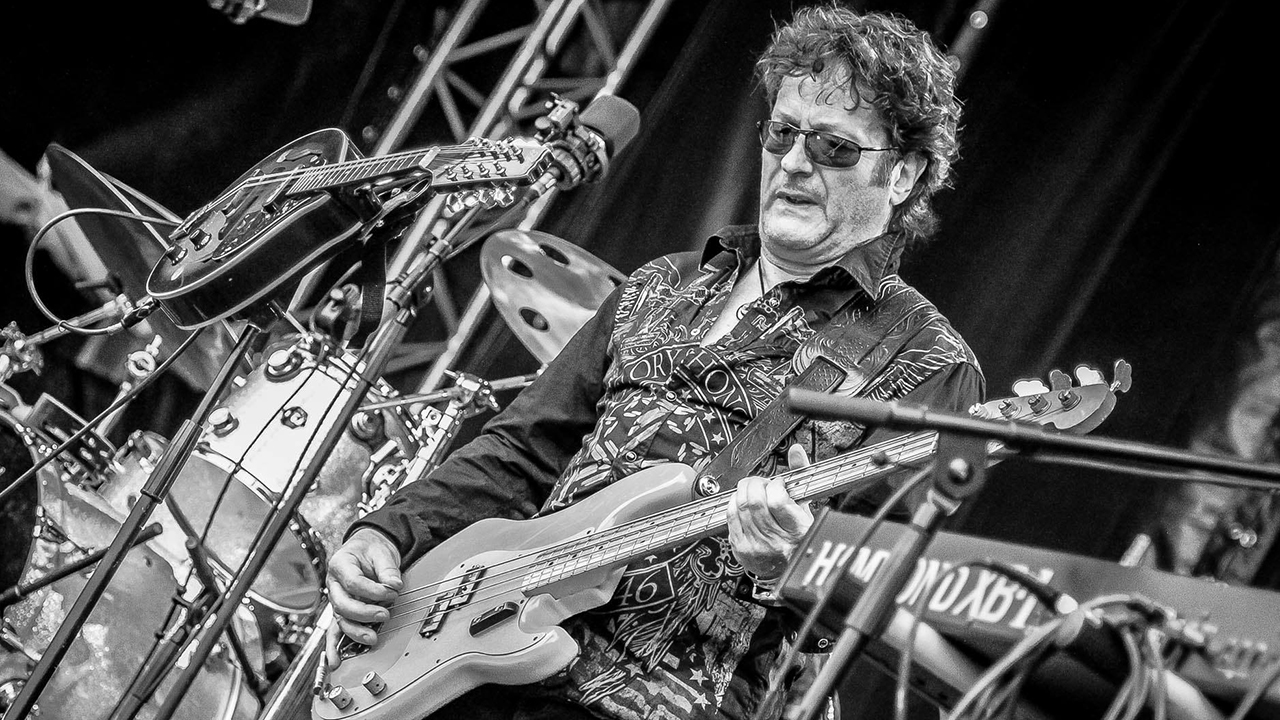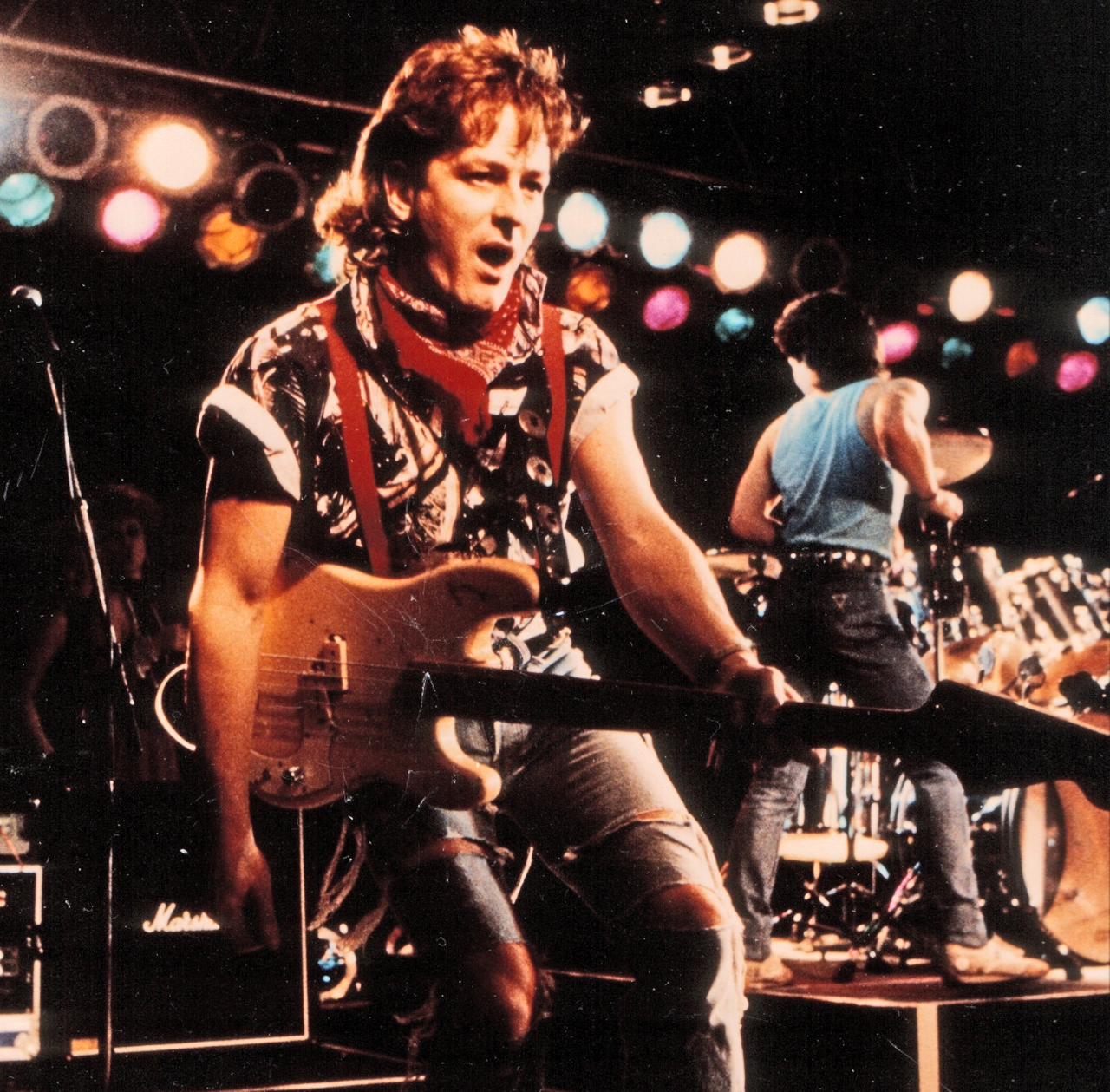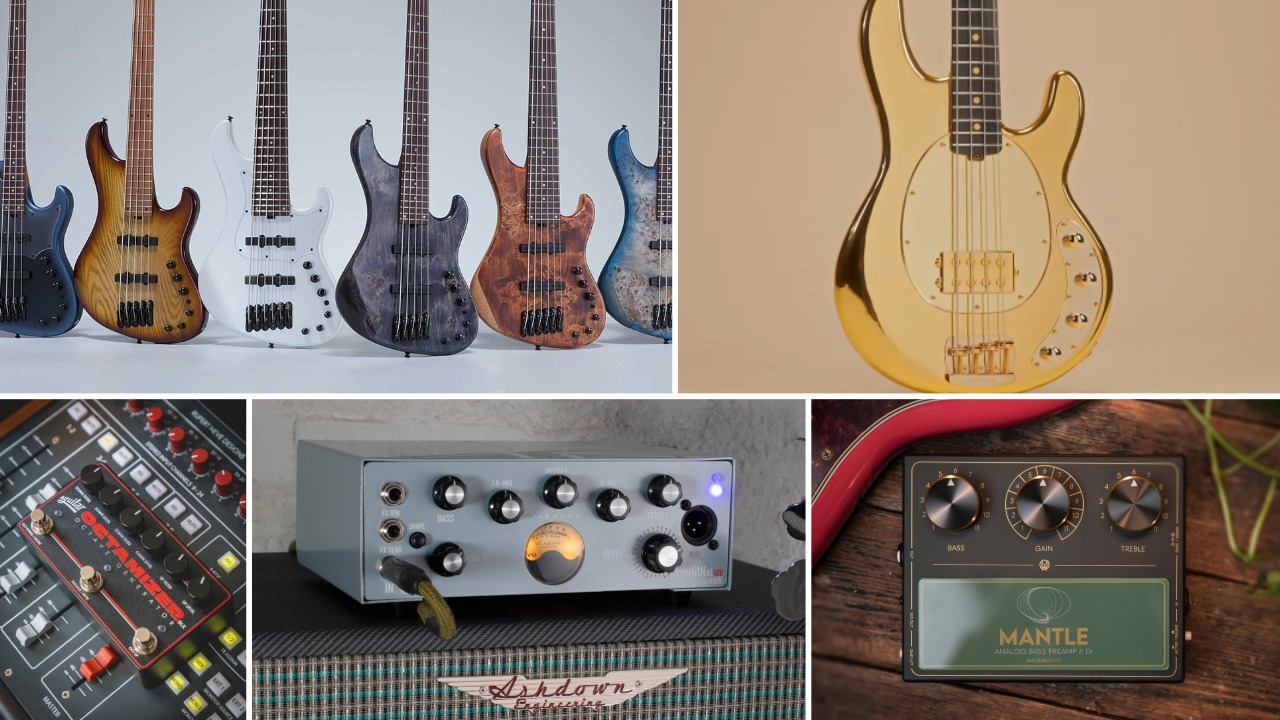“I’m not sure why the tour ended so abruptly. I never got a bunch of my gear returned. People don’t get sacked from Sabbath – they just don’t get spoken to again!” Ask Jo Burt about Freddie Mercury, Brian Setzer and The Troggs – just not Black Sabbath
The veteran bassist on his Queen and Led Zeppelin links, love for fretless, fighting with a Music Man EQ, and Tony Iommi’s smile when Geezer Butler’s Ampeg rig made a bass feel like an animal

As a low-key player’s player, Jo Burt has provided bass for The Troggs, Freddie Mercury, Brian Setzer and Black Sabbath – but he doesn’t single out his short touring stint with Tony Iommi’s band as a career highlight.
“Playing at Wembley Stadium with my own band, Sector 27, would be one,” he tells Bass Player. “And possibly opening for The Police at Madison Square Garden might be another.” When it comes to recording, he adds, “working with Freddie is a high point.”
He did learn an important lesson from Sabbath, though – the importance of retaining freedom. “I have my own band, which has been up and running for a few years. It’s allowed me to get back to writing, as in the early years with Sector 27.”
He adds: “Being in control has been of huge importance in my life. In the Black Sabbath time I had none. I’m also happy to be free of the industry, which I now realize is and always has been corrupt. No regrets!”
When you played with The Troggs, how did you nail their classic garage rock tone?
“The Troggs were my first pro band. In 1978, when we played New York City, the Ramones and the New York Dolls were in the audience along with Mick Jagger, Bruce Springsteen, Deborah Harry and Andy Warhol. Reg Presley was treated like the godfather of punk, and the band had taken on the mantle.
“I’d recently bought a silver Music Man StingRay bass. It had a great maple neck which felt like a Fender. I was lucky to have an Ampeg SVT supplied by the club, which I set to my usual tone – slight mid-cut with slight bass and treble boost.
All the latest guitar news, interviews, lessons, reviews, deals and more, direct to your inbox!
“What I hadn’t reckoned on was the EQ on the Music Man bass, which was actually more clanky than I expected. If you listen to The Troggs Live at Max’s, the bass sound is not really my thing – but boy, does it push Ronnie Bond and the band along!
“I didn’t keep the Music Man; I couldn’t get on with all that EQ and choices. I’m back to a fretted Precision as a companion to my lovely ‘battered blonde’ fretless.”
You played bass on Freddie Mercury’s Mr. Bad Guy album. What led to that?
“Sector 27 was being looked after by Elton John’s manager, John Reid, and we did extensive touring as the opening act for Elton. John had also managed Queen, and the contact with Freddie remained.
“I had also worked with Roger Taylor and Rick Parfitt on a single for Jimmy Nail, so I was already in the family of musicians around Freddie. On one of those clubbing nights out that used to happen, Freddie asked me to come to Munich.”
Did you err toward John Deacon’s bass style?
“Freddie told me to be free-thinking and not to worry about trying to be John. My style was similar anyway – ‘less is more’ has always been a mantra. I guess it was old-fashioned in the days when bass guitars were getting attention from manufacturers who were starting to offer fancy, ever more sophisticated basses.”
What were Freddie’s expectations of you as a bassist?
“On so many recording sessions for major artists, those artists are never actually there. If they are, they tend to instruct from the control room via microphone. But Freddie was a remarkable musician and totally on it in the studio.
“In the control room, or even sitting in the recording room with me, he was throwing ideas back and forth, encouraging me to experiment. He was careful to keep me at ease while being this whirlwind of ideas. Like Michael Jackson, he was able to sing the parts he wanted played.
“Freddie liked to work fast. He used to say, ‘If it’s not brilliant by the third take, move on – maybe come back tomorrow.’ On his his vocal takes that rule was never needed. Once he was prepared, his tracks were all first takes.”
You played fretless on Mr. Bad Guy. What led to that?
“Freddie had specifically asked. He really wanted to get away from all things Queen, although he was has happy enough when Brian and Roger dropped by and even made suggestions.
“Aside from some light compression applied from the control desk, it was just me and my lovely battered fretless bass plugged in direct.”
How did you hook up with Jason Bonham in Virginia Wolf?
“I got a call one day from Roger, saying he was producing this great band but they needed beefing up. He had secured Jason to play drums, and wanted me on bass. I did kind of jump at the idea! That afternoon Jason and I were certainly beefing up those tracks at Pete Townshend’s studio.”
Was the chemistry between you and Jason immediate?
“I felt a certain responsibility for this young man bouncing around like a scared bunny, following desperately in his late father’s footsteps. Eventually, being on tour in the US with him was definitely a challenge, but a nice one.
“Jason and I locked in as a rhythm section immediately. He played and sounded like his dad. After listening to Led Zeppelin II over and over at school, I was allowed to use the influence from those tracks. It was probably the first time that I acknowledged John Paul Jones’ influence. Later on, even Robert Plant said I played like him!
“After two years, Virginia Wolf crashed and burned in the flame of inexperience and internal pettiness. It was a shame – Atlantic Records had backed the band a few quid for their attempt at domination in the USA.”
What led to you getting the call for Black Sabbath’s Eternal Idol tour?
“Phil Banfield had been Virginia Wolf’s manager. He managed Ian Gillan and he was part of a bigger set-up which included Jeff Beck and Black Sabbath. When he heard Sabbath needed a last-minute replacement for their European Eternal Idol tour, he called me.”
Was there an audition?
“There was no time for an audition! I just arrived at production rehearsals, with the huge stage, sound system and lights already in place. The sound desk was set up at a distance in the aircraft-style hangar. The only rehearsal I had was a couple of days, listening to a cassette of the show and a copy of the album.”

Were you expected to play a rig and in a style similar to Geezer Butler’s?
“The rig set was three Ampeg SVT amplifiers, each with an 8x12 cabinet. As it happens I had my own SVT set up – my amp of choice – so I was familiar with them, except there were three!
“Even so, the sound wasn’t right, and after a few run-throughs, Tony said the same thing. I’d had the first amp taken away because it was distorting like crazy; the pre-amp valves had been tweaked into overdrive. Then the penny dropped.
“We put that amp back in line and the distorted sound gave my bass loads of sustain, which made Tony smile. It took some getting used to – the bass was like an animal in my hands. It was difficult to stop it resonating. My trouser legs were flapping with the sound pressure from the three big cabs!
“As a 20-something, I was more Led Zep than Sabbath. I knew the more well-known Sabbath songs, but I did struggle with identifying one or two of the titles. I was certainly not able to play like Geezer when he would virtually play a bass solo over the instrumental parts; there just wasn’t the time to learn them accurately.
“I always felt I was playing an approximation when the band launched into some of those riffs in faster time changes.”
Can you pinpoint how your style specifically differed from Geezer’s?
“My style was more melodic. But you have to remember that I followed a long list of bass players, and it was really only the earlier songs that had his style. Bob Daisley played on the Eternal Idol album.
“War Pigs was a classic which I enjoyed playing, although the solo sections were always a challenge. Glory Ride was an easy rocker. I really liked the tracks we played from the Eternal Idol album as well as the classics. It feels like a privilege to have played Iron Man.”
Was it a challenge being on the road with Sabbath during those lean ’80s years?
“Travelling was absolutely fine. Me and drummer Terry Chimes had met when he was with The Clash and I was with Tom Robinson. Tony Martin was also a newbie, so I guess there was some nervous energy on the tour bus.
I saw Brian Setzer in the Rainbow in LA. His first comment was, ‘My bass player’s got an attitude. Do you want the gig?’ He also introduced me to the best Mexican restaurant in Hollywood
“Jeff Nicholls was a funny guy and very friendly. After years of playing offstage, he had no ego; he was a very present friend to me while travelling. Tony had that classic Brummie sense of humor, which matched with Jeff, so all in all it was pretty comfortable – with four-star hotels included.
“It only felt lean when tour manager Richard Cole dragged me out of the bus, still in my sleeping bag, and told me, ‘Hurry up! We’re all going home.’”
Did he give an explanation?
“I’m not sure why the tour ended so abruptly. All the gear was impounded by the sound and light company, who hadn’t been paid. I never got a bunch of my gear returned, although I did eventually get my fretless back. People don’t get sacked from Sabbath; they just don’t get spoken to again!”
You’ve also worked with Brian Setzer.
“I knew him through his time in England with the Stray Cats, when we often hung out. I met him again in the Rainbow in LA and his first comment was, ‘My bass player’s got an attitude. Do you want the gig?’
“I had a Precision-style Peavey bass stored at a friend’s house. I hadn’t played it very much, but it meant I was able to get straight to rehearsal the next day. Even that bass felt a little over-spec for the hillbilly rock ’n’ roll we playing. I felt I should have had a semi, like an old Epiphone Rivoli bass.
“Brian was a great guy and a truly talented guitar player. He also introduced me to the best Mexican restaurant in Hollywood, which I still visit when I can!”
What are you up to now?
“The Jo Burt Experience have released four albums – the most recent one is Anglicana. We’ve done four tours of British Columbia and Calgary. France and Belgium have also been happy hunting grounds. It’s all done as a cottage industry.
“Most recently, I released a superb live album entitled Jo Burt The Live Experience in limited-edition vinyl. It’s due to be cut at Abbey Road in for a spring 2026 release.”
- Anglicana is out now.
Andrew Daly is an iced-coffee-addicted, oddball Telecaster-playing, alfredo pasta-loving journalist from Long Island, NY, who, in addition to being a contributing writer for Guitar World, scribes for Bass Player, Guitar Player, Guitarist, and MusicRadar. Andrew has interviewed favorites like Ace Frehley, Johnny Marr, Vito Bratta, Bruce Kulick, Joe Perry, Brad Whitford, Tom Morello, Rich Robinson, and Paul Stanley, while his all-time favorite (rhythm player), Keith Richards, continues to elude him.
You must confirm your public display name before commenting
Please logout and then login again, you will then be prompted to enter your display name.

![Freddie Mercury - Man Made Paradise [2025 Restoration] - YouTube](https://img.youtube.com/vi/f2BmnAcAFY0/maxresdefault.jpg)



